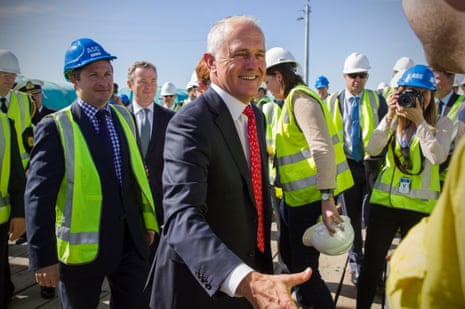The Department of Defence has been deliberately working to ensure Australian shipbuilders are removed from the naval program, the South Australian senator Rex Patrick has warned.
New documents on the submarine program, released late on Thursday, show the successful French tenderer for the Future Submarines, Naval Group (then DCNS) was prepared to partner with the Adelaide-based ASC in the build, but defence later rejected that proposal in favour of giving the build to a foreign designer.
The heavily redacted document, which the defence minister, Marise Payne, had resisted releasing citing national security and commercial reasons, contains a detailed plan by the French for working with an Australian partner.
“DCNS’s vision is to create a sovereign and sustainable industrial base within the Future Submarine Enterprise to deliver innovative solutions over the life cycle of the submarine,” the document says.
It includes plans for technology transfer and for the establishment of research hubs in Australia. One diagram makes reference to there being 1,700 jobs including design work, hull welding, fitters and electricians at ASC.
Earlier on, in a promotional brochure distributed to politicians before it was selected as the design partner, the French company outlined its plan for “two shipyards as one”, in which Australians would be trained in France but construction would occur in the ASC shipyard.
Patrick said he believes the redacted parts of the document outline how this concept of “two shipyards” would work and that it makes explicit reference to ASC.
But instead Patrick said defence had opted for the submarines to be built by a foreign subsidiary of Naval group in Australia, rather than partnering with ASC.
While this will mean that Australians will likely be employed by the French subsidiary, Patrick warned the problem will be when the build finishes.
“The commercial arrangement will mean the ‘know why’ and ‘know how’ will be transferred from the French parent company to the French daughter company in France. We will just lose all that knowledge when the subsidiary closes at the end of the build,” he said.
“This is treachery,” he said. “Coupled with a tender that explicitly prohibited Australian shipbuilders, ASC and Austal, from tendering for the $35bn Future Frigate program, it’s clear that defence has betrayed Australian industry in the execution of its naval shipbuilding agenda.
“Defence has slowly been working to ensure Australian shipbuilders are removed from the naval shipbuilding program.
“They want our new subs built by a French company, supply ships built in Spain, and the future frigates built by an Italian, Spanish or UK company and now WA shipbuilder Austal [has been] removed from the running of the offshore patrol vessel, meaning those vessels will be built predominantly by a German company.
“This has to stop.”
Asked why defence would not want to work with the government-owned ASC, Patrick said that he believed defence had a long history of being frustrated by ASC.
He said the rest of the world used defence programs to build up national shipbuilding industry.
Payne accused Patrick of “histrionics”.
On Wednesday Patrick introduced a private member’s bill, the sovereign naval shipbuilding bill, that would require all future navy vessels to be built in Australia by companies that are neither foreign-controlled nor subsidiaries of a foreign company.
The government and the department had argued that releasing the document would threaten national security, or international relations, or commercial dealings.
Payne wrote that the redacted material included information that could damage Australia’s international relations or undermine the project.
The Australian Manufacturing Workers’ Union protested last week at defence industry minister Christopher Pyne’s office following news that 200 jobs were set to go from the shipyard as work winds down on the air warfare destroyers.
